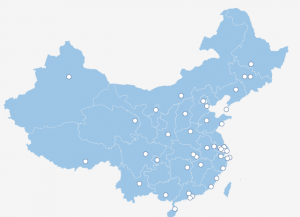Beware The 'New Cold War' Trap
Why call a relationship a war if you do not have to?
 We must avoid the “New Cold War” trap. The phrase, which attempts to describe U.S.-China relations, reflects Washington D.C.’s lazy and unipolar view on global affairs. The original Cold War concerned a rivalry between two powers that isolated themselves from each other. Comparing U.S.-China relations with the original Cold War disregards how the U.S. and Chinese economies have integrated with each other. Nor does the Cold War provide any insight into urgent issues like regulating the digital economy or the environment. Why call a relationship a war if you do not have to?
We must avoid the “New Cold War” trap. The phrase, which attempts to describe U.S.-China relations, reflects Washington D.C.’s lazy and unipolar view on global affairs. The original Cold War concerned a rivalry between two powers that isolated themselves from each other. Comparing U.S.-China relations with the original Cold War disregards how the U.S. and Chinese economies have integrated with each other. Nor does the Cold War provide any insight into urgent issues like regulating the digital economy or the environment. Why call a relationship a war if you do not have to?
Instead, D.C. should replace its bellicose nature with a foreign policy that promotes protections for ordinary people. Protecting ordinary people requires pursuing a sustainable relationship with China, not one that focuses on dominance and competition. For example, we should consider decarbonizing our economy not for the sake of competition, but in order to protect Americans. China could look to our decarbonization efforts as an example to serve its own people.
At the same time, we need to recognize the limits of our influence. A complete “decoupling” in which the U.S. and China untangle their economic interdependence is infeasible. I do, however, believe that a partial decoupling is necessary. As Professor Dani Rodrik writes, “there is little that Western countries can do, individually or collectively, to reshape China’s state-driven economic model or repressive human- and labor-rights regime.” Rather than exporting our values, Rodrik argues, we should uphold our values with trade and investment rules that ensure American firms and consumers are not directly complicit in China’s human rights abuses.

The Business Case For AI At Your Law Firm

What would incentivize China to abandon its own nascent bellicose approach? In 2019, a group of economists and lawyers proposed an alternative path to U.S.-China trade wars. The 2019 framework would promote protections for ordinary people and allow Beijing to identify specific U.S. policies that cause significant material injury to China’s ability to pursue its goals. Disagreements are inevitable; our aim should be to avoid the intense tensions that we are now observing between the two countries.
From internment camps for Japanese Americans to the Patriot Act, U.S. history offers several examples of domestic tensions arising from D.C.’s failure to check our foreign policy narratives. We have to examine how foreign policy narratives like “the Chinese threat” or “the United States’ Great Enemy” fuel violence against Asian Americans. Words matter. In the case of U.S.-China relations, more attention to phrasing will provide a basis for cooperation.
 Mandeep S. Minhas is a lawyer practicing in New York.
Mandeep S. Minhas is a lawyer practicing in New York.Sponsored

Legal AI: 3 Steps Law Firms Should Take Now

Navigating Financial Success by Avoiding Common Pitfalls and Maximizing Firm Performance

The Business Case For AI At Your Law Firm


Early Adopters Of Legal AI Gaining Competitive Edge In Marketplace

Is The Future Of Law Distributed? Lessons From The Tech Adoption Curve








